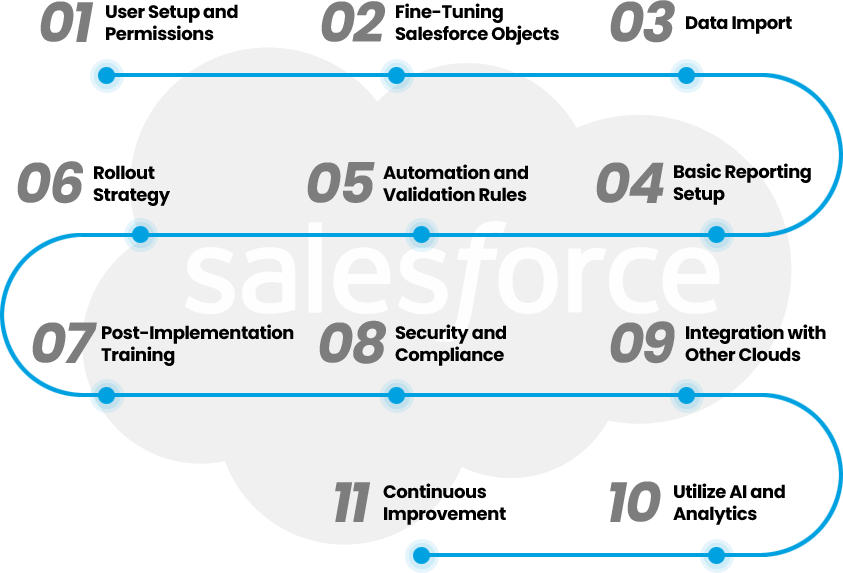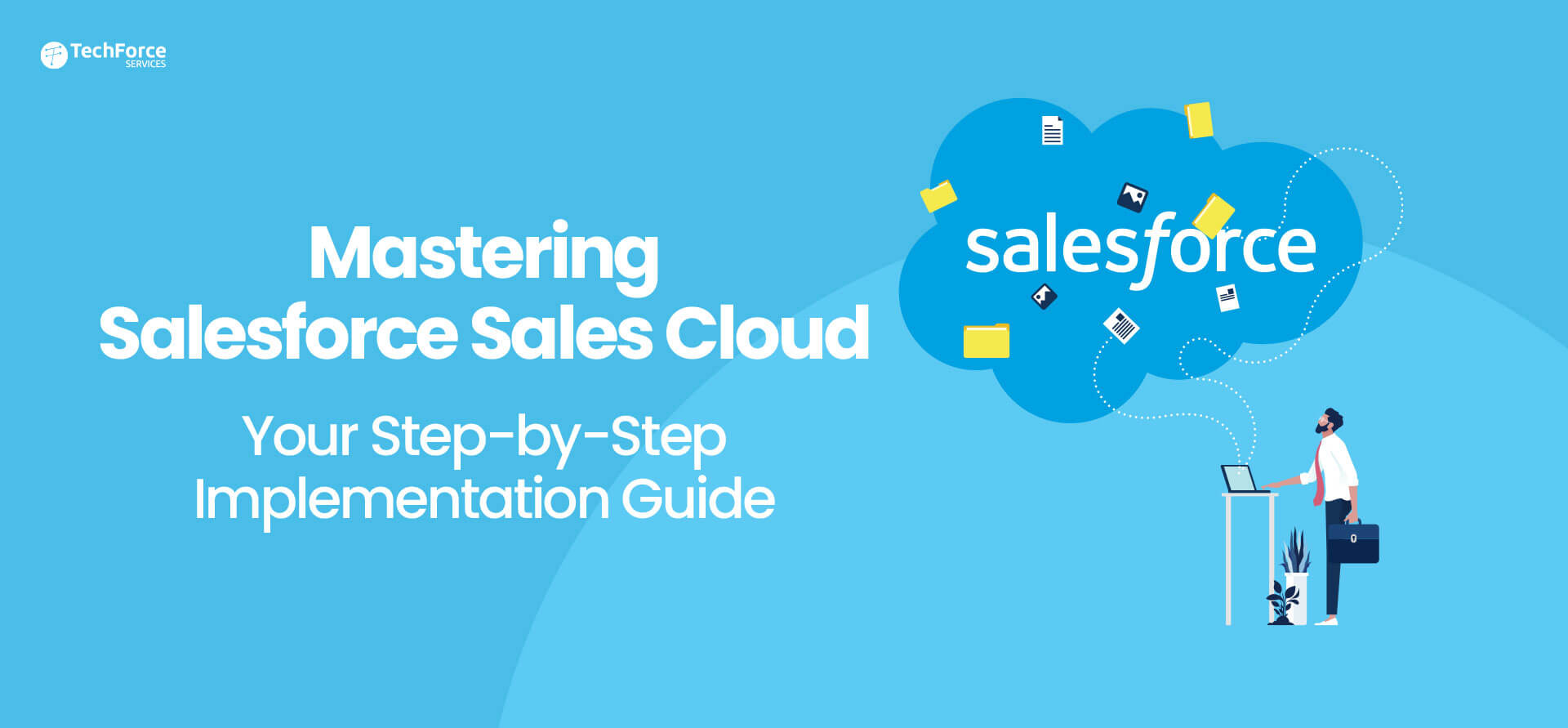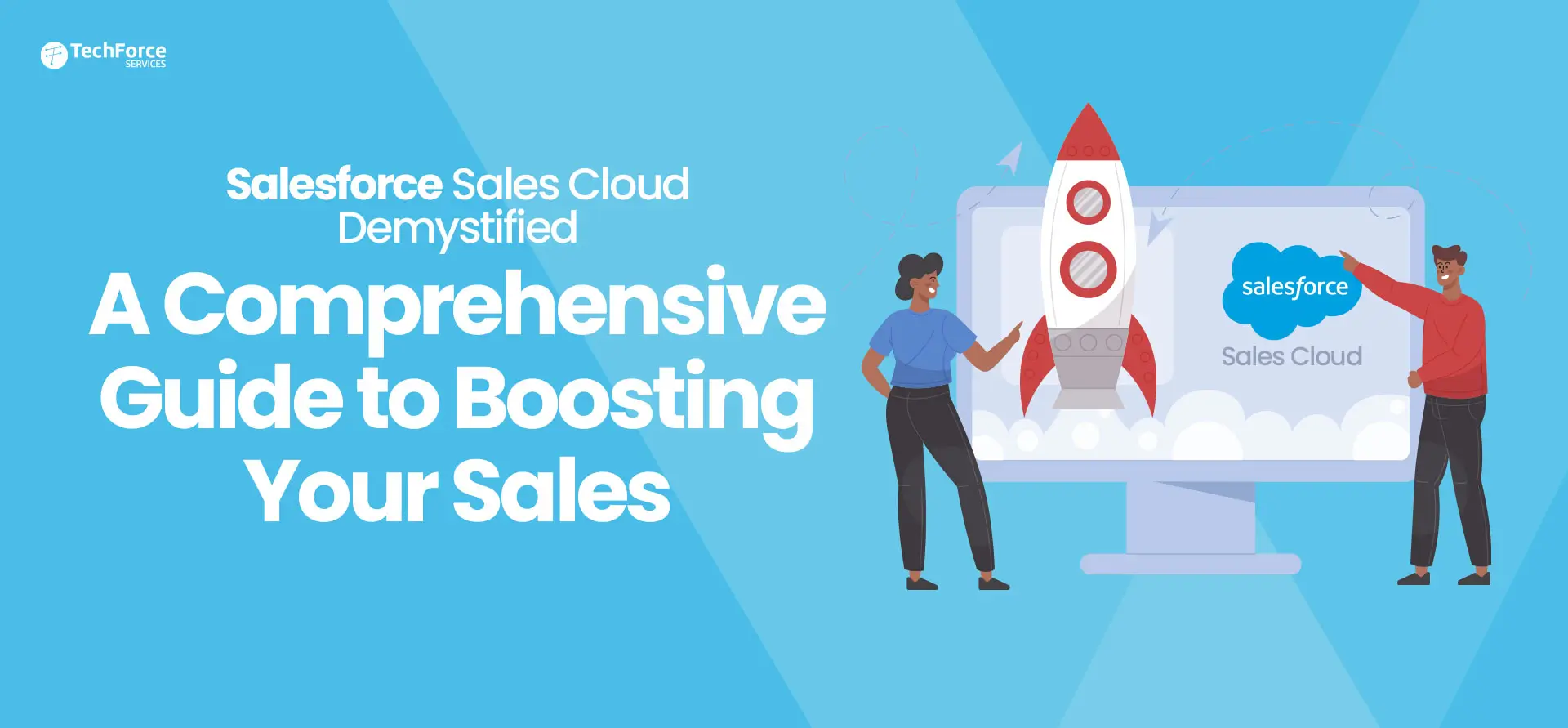Salesforce offers a tailored platform that helps organisations thrive in a competitive business landscape. In today’s world, consumers seek convenient shopping experiences, with the expectation of easy, one-click purchases. To meet these expectations, businesses can enhance their customer relationship management (CRM) using Salesforce Sales Cloud, incorporating various add-ons, customisation tools, and advanced features.
Salesforce Sales Cloud is a highly popular CRM solution that provides all the essential features necessary for businesses to tap into diverse market segments, attract new customers, manage customer data effectively, implement successful sales strategies, and boost conversion rates.
Whether you’re a small business looking to start with Sales Cloud or a large enterprise aiming to streamline your sales processes, this guide is the go-to resource for you. Let’s explore and embark on your journey to harness the power of Sales Cloud!
Whether you want an in-depth understanding of Salesforce Sales Cloud, wish to explore its features, seek insights into the implementation process, or understand how it outperforms other solutions. We will guide you through what Sales Cloud is, help you determine if your business needs it, provide insights into implementing Salesforce Sales Cloud, and highlight common pitfalls to watch out for along the way. This blog contains the answers to all of these questions.
What is Salesforce Sales Cloud?
Salesforce Sales Cloud is a comprehensive and highly customisable customer relationship management (CRM) platform designed to empower businesses in managing their sales processes efficiently. It offers a wide range of features and tools for sales teams to streamline lead generation, opportunity management, and customer interactions. With Salesforce Sales Cloud, organisations can track and manage customer data, automate sales tasks, forecast sales performance, and gain valuable insights through robust analytics and reporting.
Salesforce Sales Cloud implementation involves the process of setting up and configuring the Sales Cloud platform to align with an organisation’s unique sales needs. This includes customising the system, importing and organising data, and integrating it with other relevant tools and systems. By implementing Salesforce Sales Cloud, businesses can enhance their sales operations, improve productivity, and provide a more personalised and efficient experience to customers.
Benefits of Implementing Salesforce Sales Cloud
Implementing Salesforce Sales Cloud offers a multitude of benefits that can transform the way organisations manage their sales operations and customer relationships. Here are several key advantages:
Streamlined Sales Processes
Salesforce Sales Cloud simplifies sales tasks, helping sales teams manage leads, opportunities, and accounts efficiently. This streamlining enhances productivity and allows sales representatives to focus on selling rather than administrative tasks.
Enhanced Customer Relationship Management
The platform provides a 360-degree view of customers, enabling sales teams to better understand and cater to their needs. This results in more personalised interactions, ultimately leading to higher customer satisfaction and retention.
Improved Sales Forecasting
Salesforce Sales Cloud offers robust analytics and reporting tools, allowing organisations to make data-driven decisions. Accurate sales forecasts help in better resource allocation and planning.
Increased Collaboration
The platform promotes collaboration by facilitating communication and data sharing among team members. This boosts teamwork, which is essential for achieving sales goals.
Integration Capabilities
Salesforce Sales Cloud supports integration with various other systems and applications. This capability ensures that your sales teams have access to all the tools and data they need in one place, making their jobs more efficient.
Scalability
As businesses grow, their sales processes can become more complex. Salesforce Sales Cloud can adapt and scale with your organisation’s needs, making it a long-term and flexible solution.
To realise these benefits fully, many organisations opt for Sales Cloud consulting services, which offer expertise in customising the platform to specific needs. Additionally, salesforce sales cloud integration ensures that Sales Cloud can seamlessly work with other systems and tools in use, maximising its efficiency.
Other Guides: Pardot Setup Implementation
Steps to Implement Salesforce Sales Cloud

Salesforce Sales Cloud is a powerful customer relationship management (CRM) platform that can drive business growth. Implementing this platform effectively is crucial for maximising its benefits. Here are the key steps to successfully implement Salesforce Sales Cloud:
1. User Setup and Permissions
Begin by adding users to your Salesforce account and configuring their permissions. Assign appropriate roles and profiles to ensure that users have the necessary access to records and features. A well-structured user setup is essential for data integrity and security.
2. Fine-Tuning Salesforce Objects
Customise Salesforce objects to align with your organisation’s structure and business practices. Modify or create standard and custom fields, objects, tabs, and records as needed. Tailor the system to fit your specific workflows.
3. Data Import
Migrate existing data into Salesforce Sales Cloud. Utilise tools like the Data Import Wisard to facilitate the data import process. Ensure data accuracy and consistency during the migration.
4. Basic Reporting Setup
Configure basic reporting and automation rules. Establish processes that trigger actions based on changes in Salesforce data, such as sending records for approval or notifications for record ownership changes. Set up standard and custom reports and dashboards to derive valuable analytics.
5. Automation and Validation Rules
Leverage automation and validation rules to streamline processes and maintain data quality. Salesforce provides various automation tools, including flows and triggers, to automate tasks, update records, and send them for approval. Validation rules ensure that data entered is accurate and compliant with business requirements.
6. Rollout Strategy
Plan and execute a strategy for rolling out Salesforce Sales Cloud to your organisation. Ensure that all users are comfortable adopting the platform in their daily operations. Regularly communicate updates and enhancements as Salesforce continues to evolve.
7. Post-Implementation Training
Train your staff to use Salesforce effectively. Provide guidance and instructions for users, and establish connections with fellow administrators for knowledge sharing. Stay informed about newly launched Salesforce features to continuously improve your team’s skills and productivity.
8. Security and Compliance
Maintain a high level of security by configuring Salesforce to meet your industry-specific compliance requirements. Protect sensitive customer data and ensure that your organisation adheres to relevant regulations.
9. Integration with Other Clouds
Integrate Salesforce Sales Cloud with other Salesforce clouds, such as Marketing Cloud and Service Cloud. This integration enables you to centralise customer data, enhance marketing campaign effectiveness, and provide seamless customer support.
10. Utilise AI and Analytics
Explore the capabilities of Einstein AI, Salesforce’s artificial intelligence tool. Use AI-driven insights to prioritise leads, improve forecasting accuracy, and gain a deeper understanding of your business performance.
11. Continuous Improvement
Implement a culture of continuous improvement. Encourage users to provide feedback and make suggestions for system enhancements. Regularly review your Salesforce setup to ensure it aligns with evolving business needs.
By following these steps, you can ensure a successful implementation of Salesforce Sales Cloud, enhancing your ability to manage customer relationships, drive sales, and achieve business growth effectively.
Best Practices For Smooth Salesforce Sales Cloud Implementation
Integrating Salesforce Sales Cloud into your business processes can be a game-changer, provided you follow the right strategies. In this guide, we’ll explore the best practices that can pave the way for a successful Salesforce Sales Cloud implementation. Let’s dive into each key area:
1. Streamline with Automation
One key to efficiency is automation. Sales teams can leverage Salesforce’s automation tools to minimise tedious, error-prone tasks, enabling reps to focus on core responsibilities. This streamlines workflows, ensuring faster approvals and smoother communication. Plus, Salesforce offers a user-friendly learning platform, Trailhead, making it accessible to all.
2. Convert More Leads
Converting leads into paying customers is the ultimate goal for any business. Salesforce aids in optimising this process by helping you capture customer data effectively, prioritise leads through AI-driven predictive scoring, and measure conversion rates using sales funnel metrics. By leveraging Salesforce campaigns, you ensure a steady influx of high-quality leads into your sales pipeline.
3. Harness Data Insights
Data is the bedrock of effective decision-making. Salesforce provides valuable insights that can aid in outperforming competitors, strengthening your sales team, setting and achieving key sales goals, identifying new market opportunities, and conducting data-driven sales analysis. These insights can significantly boost your win rates and overall sales team performance.
4. Reduce Sales Rep Ramp Time
The quicker your new sales representatives reach full productivity, the better. Salesforce facilitates this process by offering easy access to essential onboarding resources. Sales reps can also benefit from a custom link generation feature, providing clarity on tasks at different opportunity stages. The Sales Cloud 360 platform ensures transparency within your sales pipeline, allowing for better forecasting based on ongoing deals.
Conclusion
Salesforce Sales Cloud is a transformative solution that greatly enhances operational and sales processes, enabling sales teams to focus on customer acquisition. Its lightning-fast experience ensures that Sales Cloud Implementation delivers the full potential of the platform, offering the latest features, functionality, integrations, and add-ons that drive a substantial return on investment.
At TechForce Services, a certified Salesforce implementation partner, we stand by our clients as they embrace Salesforce as their primary CRM platform. For those uncertain about making the transition to Salesforce, our Salesforce Experts address your business challenges.
We are committed to meeting your unique business needs. Schedule a call with our Salesforce Sales Cloud Consultants today to explore how we can empower your business.













